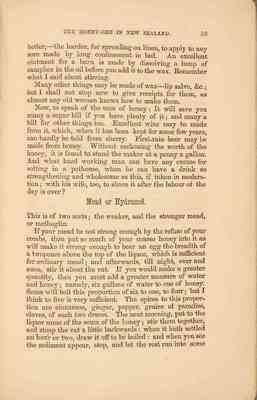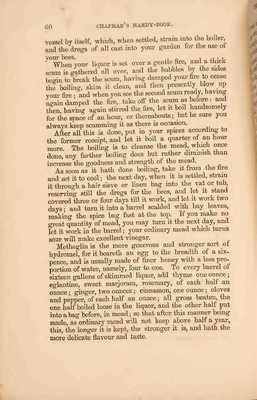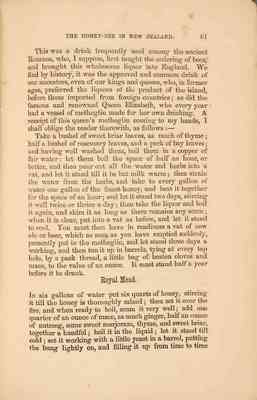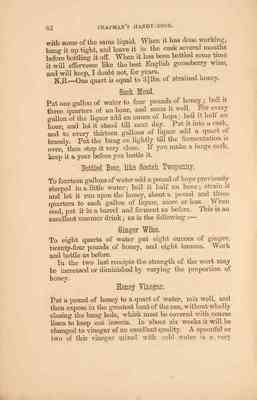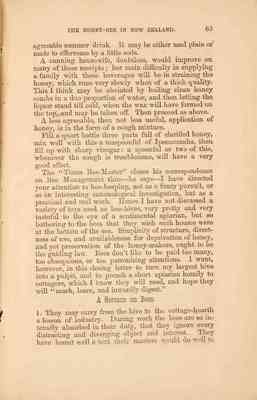Pages
THE HONEY-BEE IN NEW ZEALAND. 59
better,—the harder, for spreading on linen, to apply to any sore made by long confinement in bed. An excellent ointment for a burn is made by dissolving a lump of camphor in the oil before you add it to the wax. Remember what I said about stirring.
Many other things may be made of waz—lip salve, &c.; but I shall not stop now to give receipts for them, as almost any old woman knows how to make them.
Now, to speak of the hses of honey : It will save you many a sugar bill if you have plenty of it; and many a bill for other things too. Excellent wine may be made from it, which, when it has been kept for some few years, can hardly be told from sherry. First-rate beer may be made from honey, it is found to stand the maker at a penny a gallon. And what hard working man can have any excuse for sotting in a pothouse, when he can have a drink so strengthening and wholesome as this, if taken in moderation ; with his wife, too, to share it after the labour of the day is over?
Mead or Hydromel.
This is of two sorts ; the weaker, and the stronger mead, or metheglin.
If your mead be not strong enough by the refuse of your combs, then put so much of your coarse honey into it as will make it strong enough to bear an egg the breadth of a twopence above the top of the liquor, which is sufficient for ordinary mead ; and afterwards, till night, ever and anon, stir it about the vat. If you would make a greater quantity, then you must add a greater measure of water and honey ; namely, six gallons of water to one of honey. Some will boil this proportion of six to one, to four ; but I think to five is very sufficient. The spices to this proportion are cinnamon, ginger, pepper, grains of paradise, cloves, of each two drams. The next morning, put to the liquor some of the scum of the honey ; stir them together, and stoop the vat a little backwards : when it hath settled an hour or two, draw it off to be boiled : and when you see the sediment appear, stop, and let the rest run into some
60 CHAPMAN'S HANDY-BOOK
vessel by itself, which, when settled, strain into the boiler, and the dregs of all cast into your garden for the use of your bees.
When your liquor is set over a gentle fire, and a thick scum is gathered all over, and the bubbles by the sides begin to break the scum, having damped your fire to cease the boiling, skim it clean, and then presently blow up your fire ; and when you see the second scum ready, having again damped the fire, take off the scum as before ; and then, having again stirred the fire, let it boil handsomely for the space of an hour, or thereabouts ; but be sure you always keep scumming it as there is occasion.
After all this is done, put in your spices according to the former receipt, and let it boil a quarter of an hour more. The boiling is to cleanse the mead, which once done, any further boiling does but rather diminish than increase the goodness and strength of the mead.
As soon as it hath done boiling, take it from the fire and set it to cool ; the next day when it is settled, strain it through a hair sieve or linen bag into the vat or tub, reserving still the dregs for bees, and let it stand covered three or four days till it work, and let it work two days; and turn it into a barrel scalded with bay leaves, making the spice bag fast at the top. If you make no great quantity of mead, you may turn it the next day, and let it work in the barrel ; your ordinary mead which turns sour will make excellent vinegar.
Metheglin is the more generous and stronger sort of hydromel, for it beareth an egg to the breadth of a sixpence, and is usually made of finer honey with a less proportion of water, namely, four to one. To every barrel of sixteen gallons of skimmed liquor, add thyme one ounce ; eglantine, sweet marjoram, rosemary, of each half an ounce ; ginger, two ounces ; cinnamon, one ounce ; cloves and pepper, of each half an ounce ; all gross beaten, the one half boiled loose in the liquor, and the other half put into a bag before, in mead ; so that after this manner being made, as ordinary mead will not keep above half a year, this, the longer it is kept, the stronger it is, and hath the more delicate flavour and taste.
THE HONEY-BEE IN NEW ZEALAND. 61
This was a drink frequently used among the ancient Romans, who, I suppose, first taught the ordering of bees, and brought this wholesome liquor into England. We find by history, it was the approved and common drink of our ancestors, even of our kings and queens, who, in former ages, preferred the liquors of THE product of the island, before those imported from foreign countries; as did the famous and renowned Queen Elizabeth, who every year had a vessel of metheglin made for her own drinking. A receipt of this queen's metheglin coming to my hands, I shall oblige the reader therewith, as follows:- Take a bushel of sweet briar leaves, as much of thyme; half a bushel of rosemary leaves, and a peck of bay leaves; and having well washed them, boil them in a copper of fair water: let them boil the space of half an hour, or better, and then pour out all the water and herbs into a vat, and let it stand until it be milk warm; then strain the water from the herbs, and take to every gallon of water one gallon of the finest honey, and beat it together for the space of an hour; and let it stand two days, stirring it well twice or thrice a day; then take the liquor and boil it again, and skim it as long as there remains any scum; when it is clear, put into a vat as before, and let it stand to cool. You must then have in readiness a vat of new ale or beer, which as soon as you have emptied suddenly, presently put in the metheglin, and let stand three days a working, and then turn it up in barrels, tying at every tap hole, by a pack thread, a little bag of beaten cloves and mace, to the value of an ounce. It must stand half a year before it be drank.
Royal Mead.
In six gallons of water put six quarts of honey, stirring it till the honey is thoroughly mixed; then set it over the fire, and when ready to boil, scum it very well; add one quarter of an ounce of mace, as much ginger, half an ounce of nutmeg, some sweet marjoram, thyme, and sweet briar, together a handful; boil it in the liquid; let it stand till cold; set it working with a little yeast in a barrel, putting the bung lightly on, and filling it up from time to time
62 CHAPMAN'S HANDY-BOOK.
with some of the same liquid. When it has done working, bung it up tight, and leave it in the cask several months before bottling it off. When it has been bottled some time it will effervesce like the best English gooseberry wine, and will keep, I doubt not, for years. N.B.- One quart is equal to 3 1/2lbs. of strained honey.
Sack Mead. Put one gallon of water to four pounds of honey; boil it three quarters of an hour, and scum it well. For every gallon of the liquor add an ounce of hops; boil it half an hour, and let it stand till next day. Put it into a cask, and to every thirteen gallons of liquor add a quart of brandy. Put the bung on lightly till the fermentation is over, then stop it very close. If you make a large cask keep it a year before you bottle it.
Bottled Beer, like Scotch Twopenny. To fourteen gallons of water add a pound of hops previously steeped in a little water; boil it half an hour; strain it and let it run upon the honey, about a pound and three quarters to each gallon of liquor, more or less. When cool, put it in a barrel and ferment as before. This is an excellent summer drink; as is the following:-
Ginger Wine. To eight quarts of water put eight ounces of ginger, twenty-four pounds of honey, and eight lemons. Work and bottle as before. In the two last receipts the strength of the wort may be increased or diminished by varying the proportion of honey.
Honey Vinegar. Put a pound of honey to a quart of water, mix well, and then expose in the greatest heat of the sun, without wholly closing the bung hole, which must be covered with coarse linen to keep out insects. In about six weeks it will be changed to vinegar of an excellent quality. A spoonful or two of this vinegar mixed with cold water is a very
THE HONEY-BEE IN NEW ZEALAND. 63
agreeable summer drink. It may be either used plain or made to effervesce by a little soda. A cunning housewife, doubtless, would improve on many of these receipts; her main difficulty in supplying a family with these beverages will be straining the honey, which runs very slowly when of a thick quality. This I think may be obviated by boiling clean honey combs in a due propotion of water, and then letting the liquor stand till cold, when the wax will have formed on the top, and may be taken off. Then proceed as above. A less agreeable, thou not less useful, application of honey, is in the form of cough mixture. Fill a quart bottle three parts full of clarified honey, mix well with this a teaspoonful of Ipecacuanha, then fill up with sharp vinegar: a spoonful or two of this, whenever the cough is troublesome, will have a very good effect. The "Times Bee-Master" closes his correspondence on Bee Management thus - he says - I have directed your attention to bee-keeping, not as a fancy pursuit, or as an interesting entomological investigation, but as a practical and real work. Hence I have not discussed a variety of toys used as bee-hives, very pretty and very tasteful to the eye of a sentimental apiarian, but so bothering to the bees that they wish such houses were at the bottom of the sea. Simplicity of strucure, directness of use, and availableness for deprivation of honey, and yet preservation of the honey-makers, ought to be the guiding law. Bees don't like to be paid too many, too obsequious, or too patronising attentions. I want, however, in this closing letter to turn my largest hive into a pulpit, and to preach a short apiarian homily to cottagers, which I know they will read, and hope they will "mark, learn, and inwardly digest."
A Sermon on Bees. 1. They may carry from the hive to the cottage-hearth a lesson of industry. During work the bees are so intensely absorbed in their duty, that they ignore every distracting and diverging object and interest. They have learnt well a text their masters would do well to
